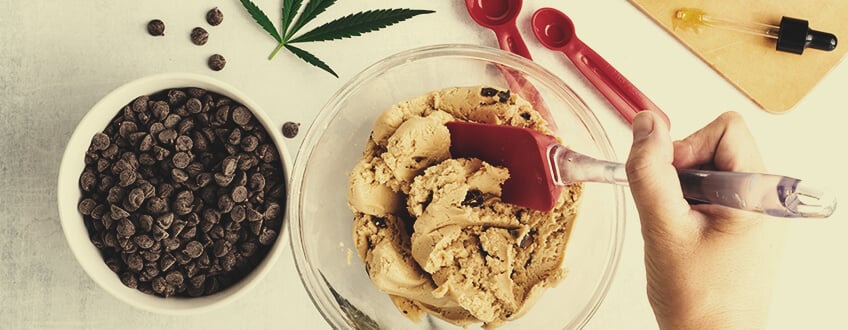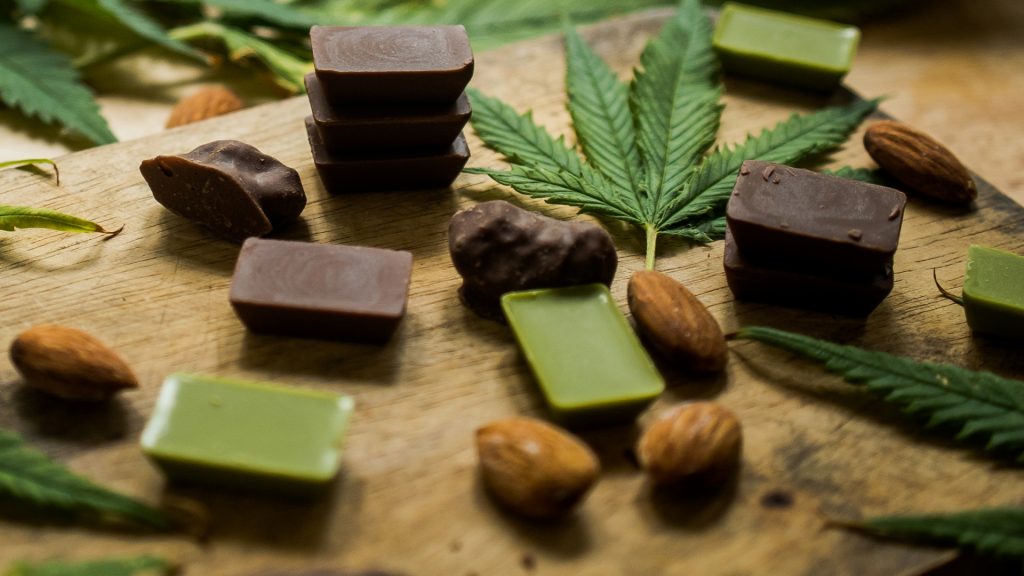Why Does Cannabis Make Food Taste Better?
3/8/2023 2:31 PM

Exploring the Connection Between Food and Cannabis
Have you ever wondered why cannabis seems to have a magical ability to make food taste better? If so, then you're certainly not alone. In this blog post, we'll be exploring the connection between cannabis and food and discussing why cannabis can have such a profound effect on our palate. Even better, how to make cannabis an addition to meals while keeping them delicious. So grab a snack and join us as we dive into the fascinating world of cannabis-enhanced cuisine!
The Connection Between Cannabis and Food
 Cannabis and food have been linked together for centuries. The first recorded instance of cannabis being used as a food ingredient was in ancient China, where it was used to make tea. Cannabis was also used as a food ingredient in ancient India, where it was used to make a type of curry. More recently, cannabis has been used as an ingredient in various food items such as brownies, cookies, and cakes.
Cannabis and food have been linked together for centuries. The first recorded instance of cannabis being used as a food ingredient was in ancient China, where it was used to make tea. Cannabis was also used as a food ingredient in ancient India, where it was used to make a type of curry. More recently, cannabis has been used as an ingredient in various food items such as brownies, cookies, and cakes.
There are many theories as to why cannabis makes food taste better. One theory is that the THC in cannabis interacts with the CB1 receptors in the brain, which are responsible for taste and smell. THC binds to these receptors and causes them to become more sensitive, increasing flavour perception. Another theory is that cannabis increases blood flow to the digestive tract, which enhances flavour perception
Whatever the reason may be, there is no denying that cannabis does indeed make food taste better. If you haven't experienced it yourself, then you're missing out!
How Does Cannabis Affect our Sense of Taste?
Cannabis has been shown to affect our sense of taste in several ways. For one, it can increase our sensitivity to certain tastes and flavours. This is why many people who use cannabis report that food tastes better when they are high. Additionally, cannabis can also change how we perceive taste. This is because THC, the primary psychoactive compound in cannabis, binds to receptors in the brain that are responsible for processing flavours. As a result, THC can alter our sense of taste and make food seem sweeter, saltier, or more savoury than it actually is. Additionally, because cannabis affects how we process information from our senses, it can also make food seem more intense in flavour. This is why some people report that everything tastes better when they are high on cannabis.
Different Strains of Cannabis and Their Effects on Food
 Different strains of cannabis have different effects on food. Some strains make food taste better, while others make it taste worse. The effects of cannabis on food vary depending on the strain, the amount of THC in the strain, and the person's individual response to THC.
Different strains of cannabis have different effects on food. Some strains make food taste better, while others make it taste worse. The effects of cannabis on food vary depending on the strain, the amount of THC in the strain, and the person's individual response to THC.
THC is the main psychoactive compound in cannabis. It is responsible for the "high" that people feel when they consume cannabis. THC binds to receptors in the brain and alters perception, mood, and cognition. THC also stimulates appetite by binding to receptors in the hypothalamus, which is why people who consume cannabis often experience an increase in hunger (known as "the munchies").
Different strains of cannabis can have different ratios of THC to CBD. THC is the main psychoactive compound in cannabis, while CBD is a non-psychoactive compound that has medicinal properties. Strains with a higher ratio of THC to CBD will generally have more psychoactive effects, while those with a higher ratio of CBD to THC will tend to be more medicinal.
The effects of cannabis on food also depend on the person's individual response to THC. Some people find that cannabis makes food taste better, while others find that it makes food taste worse. There is no right or wrong answer here - it all comes down to personal preference. If you're curious about how different strains of cannabis will affect your own experience of food, we recommend trying out a few different strains and seeing what works best for you!
The Impact of Terpenes on Taste Perception
 Terpenes are the aromatic compounds found in cannabis that give the plant its distinctive smell. They also play a role in taste perception. When you consume cannabis, the terpenes interact with your taste buds and affect how you perceive the flavour of food.
Terpenes are the aromatic compounds found in cannabis that give the plant its distinctive smell. They also play a role in taste perception. When you consume cannabis, the terpenes interact with your taste buds and affect how you perceive the flavour of food.
There are many different types of terpenes, each with its own unique flavour profile. Some common examples include myrcene (earthy), limonene ( citrusy), and pinene (piney). These flavours can enhance the taste of food, making it more pleasant to eat. In addition, terpenes can also affect your appetite. Certain terpenes can increase your appetite, while others can suppress it.
The impact of terpenes on taste perception is not fully understood. However, research suggests that they do play a role in enhancing flavour and affecting appetite. If you're looking to improve your cannabis-eating experience, paying attention to the type of terpene present in your strain may be helpful.
Exploring the Health Benefits of Eating Cannabis-Infused Foods
When it comes to cannabis, there are many different ways to consume it. Smoking and vaping are the most common methods, but eating cannabis-infused foods is becoming increasingly popular. And for good reason! Eating cannabis has a number of health benefits that you may not be aware of.
For starters, consuming cannabis-infused foods can help to increase your appetite. This is perfect for those who are struggling with conditions like cancer or AIDS that often lead to a loss of appetite. Cannabis can also help to relieve pain and inflammation, making it a great natural remedy for conditions like arthritis or Crohn's disease.
Additionally, eating cannabis-infused foods can also provide you with some much-needed relief from anxiety and stress. If you're someone who suffers from panic attacks or general anxiety, consuming cannabis in this way can help to calm your nerves and ease your mind. And last but not least, eating cannabis-infused foods can help improve your sleep quality. If you're someone who has trouble falling asleep or staying asleep, consuming cannabis before bedtime may just do the trick!
There is obviously a strong connection between cannabis and food. The key to unlocking the potential of this relationship lies in understanding why cannabis makes food taste better and how we can use it to enhance our culinary experience. From flavour pairings to marijuana-infused edibles, there are many ways that you can explore the connection between cannabis and food. With some experimentation, you will be able to find new dishes that you never thought possible with marijuana
Have you found foods taste better when you've used cannabis beforehand? Are there certain recipes and tastes you feel work better afterwards? Perhaps some you didn't like as much afterwards? Please tell us in the comments below!







